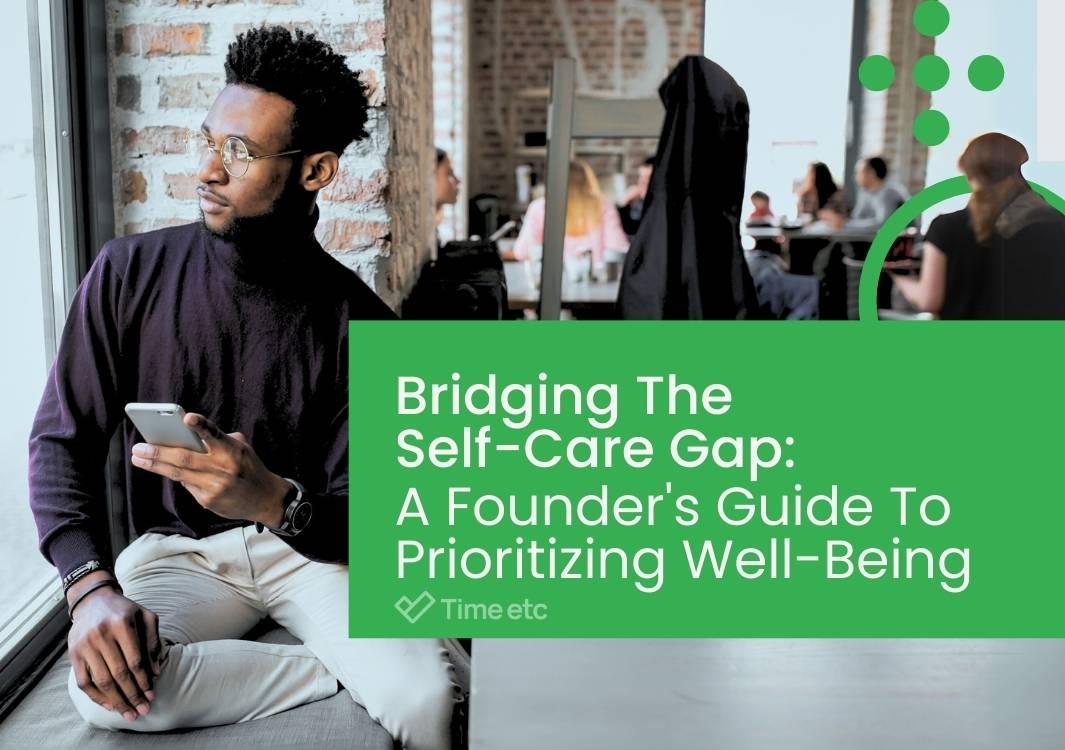As a founder, you’ve likely heard countless times how vital self-care is for success—not just for your mental and physical health, but for your business. It’s no secret what the experts say: self-care fuels productivity, sharpens decision-making, and much more, helping you show up as your best self for your team and your company.
But let’s be real—knowing the importance of self-care is only half the battle. Far too often, there’s a frustrating gap between what we know we should do and what we actually practice.
The problem isn’t a lack of knowledge or resources. It’s the personal barriers that make prioritizing self-care feel nearly impossible.
For many founders, guilt often takes center stage—how can you justify stepping away for yourself when there’s always more work to be done? For others, it’s the cultural expectations that glorify overwork and hustle, making rest feel like a luxury you simply can’t afford. Add to that the societal norms that subtly (or not so subtly) undervalue self-care, and it’s no wonder self-care gets pushed to the bottom of your priority list.
So, if you’ve been feeling stuck on the wrong side of this gap, you’re certainly not alone.
If you think it's time for a change, you've come to the right place.
Here, you'll find the three key pillars of balancing your personal needs with your professional responsibilities. (Hint: it's as simple as ABC!) And perhaps more importantly, how to make sure these new habits actually stick!
A) Audit your “body budget”
When your success depends on sharp mental clarity, sustained focus, and steady emotional regulation, leaving these up to chance each week is a pretty hefty risk.
In her book How Emotions Are Made, Dr. Lisa Feldman Barrett uses her concept of "body budgeting” to explain how we actually play a much bigger role in controlling them than we might realize.
Think of it as managing your energy and emotions the same way you’d handle a bank account—making sure you’re not spending more than you’re saving.
Here’s how it works:
- You spend energy through things like movement and working on tasks.
- You replenish it with sleep, food, and moments of rest.
- You conserve energy when you relax or take breaks.
But, just like an unexpected bill, things like heavy workloads, sleepless nights, or stressful events can take big hits out of your energy balance—leaving you with less to spend on what you need and want.
And if you’re constantly overspending without making deposits back into your account, the consequences will soon catch up with you.
So, in the same way you'd keep an eye on your business's finances to avoid running into the red, keeping tabs on your body budget is just as critical. Treat your energy like the valuable resource it is.
Here's a step-by-step guide to help you start:
- Track your habits
- Each week, give yourself a rating out of 5 (1 = poor, 5 = excellent) in three key areas:
- Exercise: Are you moving enough? This includes any form of physical activity, from walks to workouts.
- Sleep: Did you get enough quality rest to feel refreshed each day?
- Eating habits: Has your body been getting the fuel it needs? Are you staying hydrated?
- Identify energy drains
- Reflect on areas where your energy might be slipping away. Are you skipping meals, staying up too late, or pushing through stress without downtime? Identifying these “leaks” is the first step toward plugging them.
- How will you make next week better?
- Based on your weekly ratings, choose one area to focus on improving. For example:
- If your sleep score is low, aim to go to bed 30 minutes earlier or cut out the late-night screen time before bed.
- If your exercise score needs a boost, start with a short daily walk or stretch session.
- If your eating habits are off, aim to prep some nutritious meals in advance or make sure you have healthy snacks on hand to avoid the temptation of junk food.

B) Boundaries
Let’s dive deeper into what your “body budget” score tells you. What does it mean for your self-care needs?
Low "body budget" scores, along with feelings of stress, overwhelm, and resentment, are usually tell-tale signs that you need to set a boundary somewhere in your life, whether personal or professional. It's your body's way of telling you that something needs to change to protect your mental, emotional, and physical well-being.
Start by asking yourself: What boundaries would best support me right now? Take time to reflect on where you might need to draw clearer lines to reclaim your energy and peace of mind.
Boundaries aren’t just about guarding your time—although that's important! They are about creating the space you need in all areas of your life. Are there commitments you've made that no longer align with your values or goals? Are there relationships that consistently drain your energy or cause unnecessary stress? It might be time to reassess and make changes that prioritize your well-being.
Remember, boundaries are not walls but bridges to more balanced living. Setting and maintaining them might feel uncomfortable at first, especially if you're used to putting others' needs before your own. However, by prioritizing your well-being, you can show up more fully for yourself and those around you.
C) Control
Let’s face it—feeling in control makes a huge difference. It’s what makes us feel secure, capable, and confident in handling whatever life throws at us. On the flip side, feeling out of control often opens the door to stress, dissatisfaction, overwhelm, and anxiety.
As a founder juggling endless responsibilities, unexpected challenges, and a never-ending to-do list, chances are you feel like you're always playing catch-up. And let’s be honest, living in a constant state of scramble isn’t conducive to feeling in control.
But here's the thing: while you can't control everything, you can control more than you think. It might not always feel that way, but almost everything in life is an element of choice. At its core, control is about recognizing the choices available to you.
Think of it like sailing a boat. You can’t control the wind or the waves, but you can adjust your sails, choose your direction, and drop anchor when you need a break.
So, take just a few minutes each day to check in with yourself. Think about what’s within your control and where you can make choices that will have the biggest impact on your day, your outlook, and your outcomes.
Whether it’s setting a much-needed boundary or prioritizing work that will take your business further, making positive, proactive choices can give you that feeling of control back, helping to ease some of that stress.
And here’s an important reminder: trying to control too much can backfire. It’s easy to get caught up in the pursuit of perfection, especially when you want everything to go just right. But when we hold on too tightly, micromanaging every detail, it can lead to more stress, not less. The real goal is finding that sweet spot between chaos and calm, where you’re in the driver’s seat without gripping the wheel so hard your knuckles turn white.

How to actually make it all happen
We all know self-care is vital, yet it’s often the first thing that falls by the wayside, despite our best intentions.
Take New Year’s resolutions, for example.
Research shows that only 9% of people stick to their resolutions and achieve them, while 23% abandon them by the end of the first week, and almost half (43%) will call it quits by the end of January.
So if you're thinking, "This sounds great in theory, but how is this time going to be any different?"—that’s exactly the right question to ask!
The key is identifying what’s been holding you back and taking deliberate, actionable steps to remove those barriers. By clearing the way for positive change, you’ll set yourself up for success—not just for a few weeks, but for the long term.
Get comfortable with caring
If you’re not currently prioritizing your own well-being, take a moment to ask yourself, “Why not?”
What’s stopping you from truly caring for yourself? Is it the demands of work? The expectations of others? Or perhaps a long-held belief that self-care is indulgent or unnecessary? Whatever it is, is it really worth the cost to your overall well-being and effectiveness as a leader?
Yes, as a founder, you’ll face tough decisions and have to make some sacrifices along the way—but your health and relationships shouldn’t have to be among them.
So, give yourself permission to do what’s necessary to show up as the best version of yourself.
It might feel uncomfortable to put your needs first, especially if you’re not used to it. But it's no secret that a burned-out, stressed-out, sleep-deprived leader can’t inspire, motivate, or perform at their best. By investing in yourself, you’re not just improving your own quality of life, you’re also creating a stronger foundation for those who depend on you.
Keep reminding yourself that self-care isn't selfish—it's non-negotiable.
See: Why Doing Everything Yourself Is Costing You More Than You Think
Create the space you need
How many times have you said, “I would love to do X, but how can I possibly find the time?”
As we mentioned above, almost everything in life is a matter of choice. We're not suggesting that your schedule isn’t bursting at the seams, but that you have more power to change the narrative than you might realize.
Chances are, all you need is a combination of effective time management, delegation, and prioritization.
For instance, outsourcing tasks to a virtual assistant (VA) helps you create much-needed space in your schedule, opening up more opportunities for choice that put you back in control—rather than feeling like a slave to your to-do list. More importantly, it gives you the breathing room you need to set and maintain those boundaries and implement any changes that will boost your “body budget” scores.
But, if time (or lack thereof) still feels like your biggest challenge, try conducting a time audit.
Start by tracking how you spend your days over the course of a week. You can do this with something as simple as a notebook and pen, or time-tracking apps like Toggl, RescueTime, or Time Doctor for more precision. This exercise will help you see where your time really goes, so you can spot patterns, identify time-wasters, and uncover more areas where setting boundaries could boost both your productivity and well-being.
See: 9 Signs That You Need a Virtual Admin Assistant

Start small
Drastic changes rarely stick. In fact, experts say it’s one of the top reasons why most New Year’s resolutions fail.
According to Dr. Asim Shah, professor and executive vice chair of the Menninger Department of Psychiatry and Behavioral Services at Baylor College of Medicine, the problem lies in trying to do too much, too quickly. Instead of trying to completely overhaul your routine overnight, the key is to take small, manageable steps that ease you into a new habit or routine.
A good way to do this is to shrink your new self-care goals down to the smallest possible action.
For example, if you want to get into the habit of going for a run every day after work, your goal should simply be to put on your running shoes. That’s it. Once your shoes are on, you might feel motivated to step outside, take a walk, or even run for a few minutes. The momentum builds naturally, and you’re more likely to stick with it over time.
Another approach is to build on habits you already have. For instance, if you’re trying to drink more water, tie the new habit to something you already do, like enjoying a morning coffee. Before or after each sip of coffee, take a sip of water. This technique, often called “habit stacking,” lowers the effort required to remember or initiate the new behavior and makes it easier to integrate into your daily life.
Avoid “all-or-nothing”
When it comes to forming new habits or working toward goals, perfection isn’t the goal—persistence is. The “all-or-nothing” mindset (the idea that you must do something perfectly or not at all) often leads to unnecessary frustration, and even self-sabotage.
Because the truth is, some days, you’ll nail it. Other days, life might throw you off track.
Missed a workout because your day was packed with meetings? Pulled an all-nighter to meet a deadline? These moments don’t mean you’ve failed, or that there’s no point in continuing. They’re simply part of the journey.
Instead of throwing in the towel or falling into a spiral of guilt, just hit the reset button and start afresh tomorrow. Consistency isn’t about doing everything right every single day; it’s about showing up more often than not.
Find an accountability partner
Research shows that when you tell someone about your plans, you’re significantly more likely to stick to them.
A study by The Association for Talent Development found that simply having a goal only gives you about a 10% chance of reaching it. Tell someone that you've committed to that goal, and those odds jump to 65%. Set regular check-ins with that person, and your chances of success soar to an incredible 95%!
Why is this?
Because accountability adds a layer of responsibility and motivation that goes beyond just yourself.
An accountability partner can be a friend, family member, coworker, or even a coach—someone who understands your goals, supports your efforts, and is willing to check in regularly. Knowing that you’ll need to update them on your progress creates a subtle but powerful pressure to stay committed. After all, admitting you didn’t stick to your plan can feel uncomfortable, and most of us naturally want to avoid disappointing someone who’s cheering us on.
But the benefits go beyond just motivation. A good accountability partner can offer fresh perspectives, creative solutions, and valuable encouragement. It’s not just about reporting your progress; it’s about having someone in your corner who genuinely wants to see you succeed.
Whether it’s a quick daily text, a weekly check-in call, or sharing updates over coffee, incorporating these regular touchpoints into your self-care goals can be a real game-changer.

What’s the bottom line?
With over 17 years of experience supporting founders, we've seen first-hand that sustainable success isn’t built on sacrifice and struggle. It’s paved with healthy boundaries, intentional self-care practices, and smart systems that support both your well-being and your business.
By now, most business owners know that self-care is essential for maintaining physical health, mental clarity, and peak productivity. But understanding its importance is one thing—actually putting into practice can be a whole different story.
Bridging the gap between awareness and action takes more than wishful thinking. The good news is, all it takes is clear intentions, thoughtful planning, and sometimes finding the courage to offload tasks or simply say “no” when you need to.
But, why wait?
If you're ready to create much-needed space in your schedule and get the support you deserve, Time etc has got you covered.
We're here to connect you with qualified, capable virtual assistants who can take care of all the admin tasks weighing you down and holding you back.
We know how tough it can be to carve out the time and energy needed to recruit, hire, and onboard a new assistant, so we’ll take care of it all for you! With us, you'll save up to three to six weeks of recruitment time, 90% of traditional hiring costs, plus the time and effort of managing your assistant on a day-to-day basis.
So, ready to get started?
Simply reach out to our expert team, and we’ll handle the rest.
Or, answer a few quick questions to receive personalized task recommendations tailored to your unique needs and enjoy $150 off your first month of virtual assistant support!











